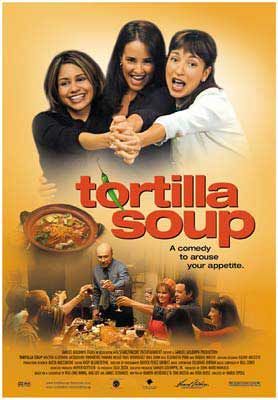“The Family that Eats Together, Stays Together”

| None | Light | Moderate | Heavy | |
|---|---|---|---|---|
| Language | ||||
| Violence | ||||
| Sex | ||||
| Nudity |
What You Need To Know:
TORTILLA SOUP is like a cross between THE AMATI GIRLS and THE BIG NIGHT. The characters are endearing and sympathetic. In spite of their flaws, they love each other, and the audience should like them. This movie has a basic Christian worldview, with some positive references to Jesus Christ. Detracting from these elements, however, are several non-Christian, immoral elements, including a reference to “Fate” and an overly cavalier attitude toward the sexual dalliances of the most promiscuous sister, Carmen. Therefore, MOVIEGUIDE® recommends extreme caution, even though the father reflects the love of God in his sacramental Sunday family meals
Content:
(C, BB, Pa, Ro, L, S, A, D, M) Sacramental Christian worldview with many eclectic elements including positive references to Jesus, refutation of bigotry, honesty commended, & positive patriarchal family structure, but with references to fate, luck & do-your-own-thing romanticism; 7 lightweight obscenities & 5 profanities; no violence; implied, suggested & off-screen fornication; no nudity but revealing clothes & suggested nudity; alcohol use; smoking; and, love overcomes family feuds.
More Detail:
The actual story starts immediately thereafter with Martin (played wonderfully by Hector Elizondo of THE PRINCESS DIARIES), preparing a sumptuous afternoon feast. Martin is a widower and a great chef who has raised his three daughters with love and compassion, although it’s clear that he is the patriarch. He considers the Sunday afternoon meal sacred in a sacramental sense, an outward and visible sign of the love holding the family together.
Martin’s three daughters do not completely love the Sunday meal, but they love their father. They break engagements and cut off relationships to be there with him.
The oldest, Letitia, is a prim and proper schoolteacher. Everyone expects her to be an old maid. She has abandoned the Catholicism of her family for an evangelical faith in the only true love of her life, Jesus Christ. She is not over the top, but comes close at moments, such as when she says that “Jesus was not Catholic, He was a Christian,” while her friend’s hairdresser corrects her and says “Jesus was a Jew.” Her Sunday prayers are often directed at the other members of her family, especially Carmen, an attractive and successful executive who believes in free love, but not permanent relationships.
Carmen is also a great cook and tends to squabble with her father about his dishes. Evidently, when his wife died, Martin lost his sense of taste and smell, so his Cuban partner, Gomez, has to taste the food for him. In spite of this handicap, people liken Martin to the composer Beethoven who went deaf, yet continued to produce musical masterpieces.
Maribel, the baby of the family, is trying to find herself. She does so by throwing herself into the arms of Andre, or Andy, a boy from Brazil who has come to America to find himself.
Joining this mix of characters is the friend Yolanda and her mother Hortensia, played by Raquel Welch, who tries to add Martin to her list of husbands.
TORTILLA SOUP is like a cross between THE AMATI GIRLS and THE BIG NIGHT. The characters are endearing and sympathetic. In spite of their flaws, they love each other, and the audience should like them.
The heart of the operation is the food preparation. Anybody who likes watching the cooking channel, and there are many of us, would love to watch this food preparation, which is directed by two of LA’s hottest chefs, known on the cooking channel as Too Hot Tamales.
TORTILLA SOUP almost slides into being syncretistic. (Syncretism is the combination of different, usually incompatible, forms or systems of belief and/or practice.) For example, the church at the beginning is slightly refuted by the father’s mention of “Fate” at the end.
Underneath this eclectic attitude, however, is the sacramental essence of the movie. A sacrament by definition is an outward and visible sign of an inward and spiritual grace. Thus, a sacramental ceremony or sacred ritual reflects the spiritual reality within. Beneath the surface of the dalliances, the concessions, the family squabbles, and the personal heartbreaks is the father’s love for his children, which is itself a metaphor for a greater love.
Although Letitia is not the best witness to Jesus ever seen in a movie, she is not mocked. She is a real believer, with passions and flaws.
The direction and acting in this movie is wonderful most of the time. Like many character-driven dramas, there are moments, however, when it sags, when the dialogue is not sharp enough, or when the acting becomes static or goes over the top.
Regrettably, there are too many plot points. Plot points, of course, spin a story around and take a story from the direction it is going to a new direction. Movies need plot points to mark the different acts and to give depth to the plot, but too many plot points are exhausting and sometimes appear contrived.
Also, regrettable, is the casual attitude toward fornication in the movie. For instance, on the way to the first Sunday dinner, Carmen stops off at her friend Jeff’s house for a quick tryst. The bare minimum suggestion of this tryst is shown. Jeff says he wants them to be a couple, but Carmen wants fame and fortune. By the end of the movie, Carman realizes neither quick trysts nor fame and fortune are not the answer to her needs, but the movie has a lax attitude toward her dalliances and toward Maribel’s relations with Andy. On the other hand, when Letitia gets into a romantic relationship, she makes a point of getting married, albeit quickly in Las Vegas before letting their passions run wild.
Martin the patriarch is clearly perplexed and sometimes even pained by the Americanization of his children, but he loves them through these situations and tries to guide them in the right direction. He admits that he is learning, but he has done his best to be a single father. In many ways, Martin reflects the love of God in his sacramental Sunday family meals.


 - Content:
- Content: 




